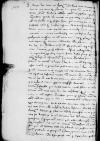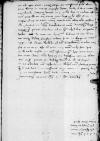Accepi hic tuas, mi carissime Eobane, vere amicas, vet[eris] tui in me amoris plenas ⌊⌋, quas mihi a te commenda[tus] doctor ⌊Ioannes Rudelius⌋ reddidit. Ceterum non egebas apud [me] iampridem cognitum tibi amicum ea, qua uteris, excusatione, quod [raro] ad me scribis et quodforsan hinc, cum minime sim in mal[um] suspicax, nescio quam sinistram suspitionem de te concipere debuerim, [can]dorem animi mei cognitum iam a multis habens annis [non] metientem amicitias emolumentis aut quibusvis aliis fucis
cf. Adagia 1526 No. 2527 obtrudere palpum; Dantisci Carmina 42.2, 521-522 Blandidici palpant, dant auribus; inde mereri Praemia contendunt, inde placere volunt. ⌊⌊⌋cf. Adagia 1526 No. 2527 obtrudere palpum; Dantisci Carmina 42.2, 521-522 Blandidici palpant, dant auribus; inde mereri Praemia contendunt, inde placere volunt. ⌋ vicissim et non amici utuntur. Neque plurisest ap[ud] me corporum quam animorum coniunctio, illa plerumque praesentia [au]dit, haec sui desiderio numquam non esse grata potest, neque umquam du[lci] caret memoria, per quam
cf. Verg. A. 4. 83 illum absens absentem auditque, videtque; Adagia 1526 No. 1684 Praesens abest (-- contra qui amant, absentes praesentes sunt veluti de Didone Verg.: Absens absentem auditque videtque ⌊absentem absens auditque videtquecf. Verg. A. 4. 83 illum absens absentem auditque, videtque; Adagia 1526 No. 1684 Praesens abest (-- contra qui amant, absentes praesentes sunt veluti de Didone Verg.: Absens absentem auditque videtque ⌋. Qu[are], licet corporibus per satis ampla spatia dissiti sumus,quod te tuamque dulcissimam consuetudinem, qua toties oblectatus sumplus [quam] suaviter, in mentem reducere soleo saepius et non secus, atque si praes[ens] esses, iucunde et – quod tuum fuit – poetice tecum confabulari,tantum a[best], quod vel minima in re concepta inter nos amicitia diminui p[ossit] aut apud me suspitionem mutuo nostro amori non convenientem ad[mit]tere, et hoc tibi certo de me persuade. Fuit mihi non vulgariter [gratum], quod te audio ad ecclesiam propius accessisse decanatumque, ut vocant, vivarium suscepisse[1], quo ⌊Musas⌋ tuas non aquis solum ex ⌊Helic[one]⌋, verum etiam mero mero frequenter exhilaras. Quod si mihi esses p[ro]pinquior, non possem committere, quin et ⌊⌋[2] adderem, quae, ut scis, non enervos etiam reddere solet ve[rsus], quo ⌊Homerus⌋ tuus[3] tanto exiret armatior atque robustior, [quam]vis certo sciam illi nihil te ductore defuturum. Scribis m[ihi], carissime Eobane, quod fides tua
constabit firmissime in eo, quod po[lli]citus sis ⌊Ratisbonae⌋ te mihi ⌊Homerum⌋ tuum dedicaturum. Idipsum gratissimo
suscipio animo, verum, cum videam adeo ingens immortalitatis beneficium me non esse meritum, non possum non pudore [a]ffici, qui non habeam unde tibi solvendo esse possim. Animi [ta]men gratitudo et quicquid praestare gratitudinis valeo [non] umquam deerit. De ⌊Campense⌋ nostro quod cupis fieri, quid rer[um]
aut ubi agat, certior, paucis accipe ex novissimis, ⌊⌋[4]. Scribit se bene tractari a ⌊cardinale Contareno Veneto⌋, et quod multae bonae ei condiciones offerantur, quasilli ex animo faveo, verum longe mihi esset gratius, si rursus ad me in vetus nostrum contubernium redire velit. Possem illi, factus paulo ante coadiutor, ut vocant, Varmiensis, longe magis quam prius commodare. Ab eo tempore nihil de eo compertum habeo . Tu cura, mi carissime Eobane, ut cum ⌊coniuge tua⌋ tuisque omnibus faustissime valeas. In tot hic ⌊Reipublicae⌋ et meis negotiis domino ⌊doctori Rudelio⌋ ad tuam commendationem, ut volui, otiosus et ex re eius esse non potui, neque tantum mihi fuit temporis, ut illi vale, consilio tum nostro astrictus, quando has a me expetebat, coram dicerem, immo has post eius discessum nescio cui alteri dari iussi. Parces igitur dabisque veniam, si tibi ad singula in ea celeritate non responderim. Nihil mihi facturus gratius quam si me tuis humanissimis et pro more nostro poeticis litteris[5] saepius inviseres. Iterum vale.
[1 ] Biography of Eobanus in NDB contains no information about his ecclesiastical functions
[2 ] Ceres nostra Gdanensis means a beer brewed in Gdańsk
[3 ] At the time, Eobanus was working on a translation of The Iliad into Latin, wich was first published in 1540 in Basel (Poetarum omnium saeculorum longe principis Homeri Ilias ... Helio Eobano Hesso interprete, Basileae MDXL). Contrary to what Eobanus has promised in ⌊⌋ and, before that, personally in Ratisbon, this translation is not dedicated to Dantiscus, but to another neo-Latin poet and well-known statesman, Gaspar Schets de Grobbendonck (Ad -- dominum Casparem Schetum Corvinum patricium Antverpiensem amicum carissimum suum)
[4 ] This letter form Campensis to Dantiscus was posted in May, not in August. Writting the text, Dantiscus was doubtless thinking about the date of reception of the letter, which is also confirmed by the verb habui. To eliminate the suggestion that Dantiscus received the letter in Rome, the word order has to be changed
[5 ] The editor knows 6 poetical letters from Eobanus to Dantiscus: ⌊⌋, ⌊⌋. The other 4 printed among of Eobanus poems (Eobanus, p. 198-199, f. 321v-322v (print partly paginated, partly folioed)), undated, two of them, addressed to Dantiscus the royal secretary, were probably written in February 1512 when Eobanus and Dantiscus were in Cracow for the betrothal of Sigismund I and Barbara Zapolya (cf. cf. VREDEVELD 2002 ⌊Vredeveldcf. VREDEVELD 2002 ⌋), and two are addressed to Dantiscus the Chełmno bishop

